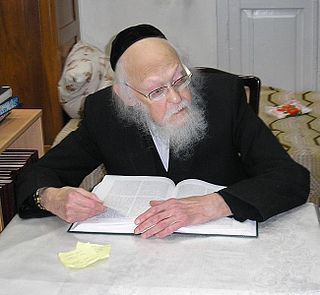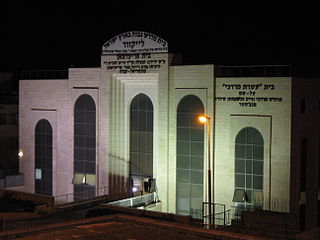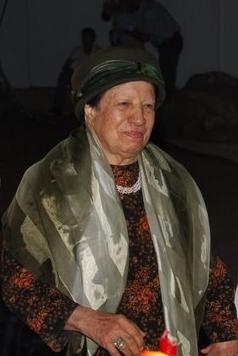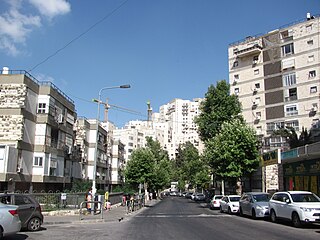
Yosef Shalom Elyashiv was a Haredi rabbi and posek who lived in Jerusalem. Until his death at the age of 102, Rav Elyashiv was the paramount leader of both Israel and the Diaspora Lithuanian-Haredi community, and many Ashkenazi Jews regarded him as the posek ha-dor, the contemporary leading authority on halakha, or Jewish law.

Givat Shaul is a neighborhood in West Jerusalem. The neighborhood is located at the western entrance to the city, east of the neighborhood of Har Nof and north of Kiryat Moshe. Givat Shaul stands 820 meters above sea level.

Har HaMenuchot is the largest cemetery in Jerusalem. The hilltop burial ground lies at the western edge of the city adjacent to the neighborhood of Givat Shaul, with commanding views of Mevaseret Zion to the north, Motza to the west, and Har Nof to the south. Opened in 1951 on 300 dunams of land, it has continually expanded into new sections on the northern and western slopes of the hill. As of 2008, the cemetery encompasses 580 dunams in which over 150,000 people are buried.
Midrash Shmuel is a Haredi yeshiva catering to English-speaking students, located in the Sha'arei Hesed neighborhood in West Jerusalem. It was founded in 1993 by Rabbi Binyomin Moskovits, and was named after his mentor, Rabbi Shmuel Rozovsky.

Mishpacha- Jewish Family Weekly is a Haredi weekly magazine package produced by The Mishpacha Group in both English and Hebrew.

Rabbi Avruhum Yitzchok Ulman is a senior Haredi rabbi living in Jerusalem.
EYAHT, was a full-time college for advanced Jewish learning for women in Jerusalem.
In Judaism, a person who is shomer Shabbat or shomer Shabbos is a person who observes the mitzvot (commandments) associated with Judaism's Shabbat, or Sabbath, which begins at dusk on Friday and ends after sunset on Saturday.
Gemach is a Jewish free-loan fund that subscribes to both the positive Torah commandment of lending money and the Torah prohibition against charging interest on a personal loan to a fellow Jew. Unlike bank loans, gemach loans are interest-free, and are often set up with easy repayment terms.

Dov Schwartzman, also called Berel Schwartzman, was a Russian-born American Haredi Jewish rabbi, educator, Talmudic scholar, and rosh yeshiva (dean) of Bais Hatalmud, which he founded in the Sanhedria Murhevet neighborhood of Jerusalem and led for over 40 years. He also founded and led the Talmudical Yeshiva of Philadelphia together with Rabbi Shmuel Kamenetzky, and co-founded the first yeshiva in Israel for baalei teshuva. He taught tens of thousands of students, many of whom received semicha from him.

Lakewood East, officially Beth Medrash Govoha of America in Eretz Yisroel, is a yeshiva in East Jerusalem, headed by Rabbi Yaakov Eliezer Schwartzman, son of Rabbi Dov Schwartzman and the eldest grandson of Rabbi Aharon Kotler, founder of the Lakewood Yeshiva. It is officially a branch of the American yeshiva.

Yitzchok Zilberstein is a prominent Orthodox rabbi, posek and expert in medical ethics. He is the av beis din of the Ramat Elchanan neighborhood of Bnei Brak, the Rosh Kollel of Kollel Bais David in Holon, and the Rav of Mayanei Hayeshua Medical Center in Bnei Brak. His opinion is frequently sought and quoted on all matters of halakha for the Israeli Lithuanian yeshiva community.
Kiryat Sanz is a Haredi Jewish neighborhood in Jerusalem. It is located in the northwestern part of Jerusalem.
Beit Hadfus Street, also spelled Beit Hadefus, is an east–west street in the Givat Shaul industrial zone in western Jerusalem.

Nosson Meir Wachtfogel, known as the Lakewood Mashgiach, was an Orthodox rabbi and long-time mashgiach ruchani of Beth Medrash Govoha in Lakewood, New Jersey. He was one of the primary builders of that yeshiva into a world-class institution, enacting the goals and direction set forth by its founding rosh yeshiva, Rabbi Aharon Kotler. He also helped establish "branches" of the Lakewood Yeshiva in dozens of cities, and pioneered the community kollel concept with the opening of combination Torah learning/outreach centers in the United States and other countries. A revered mentor and guide to thousands of students over a career that spanned more than 50 years, he was a strong advocate and prime example of musar study and working on one's spiritual self-development.

Akiva Ehrenfeld was an Orthodox Jewish rabbi who helped establish the Kiryat Mattersdorf and Unsdorf neighborhoods of northern Jerusalem. He served as president of Kiryat Mattersdorf and president of the Chasan Sofer Institutions in the United States.

Bracha Qafih also known as Bracha Kapach was an Israeli rabbanit, wife of Rabbi Yosef Qafih, who was awarded the Israel Prize for her charitable work.

Yosef Tzvi Dushinsky is the third Rebbe of the Dushinsky Hasidic dynasty of Jerusalem, Israel. He assumed the leadership of the Hasidut upon the death of his father, Rabbi Yisroel Moshe Dushinsky, second Dushinsky Rebbe, in 2003. The Dushinsky Hasidic movement was founded by his grandfather and namesake, Rabbi Yosef Tzvi Dushinsky, in Jerusalem in the 1930s. Both his father and grandfather also served as Gaavad of the Edah HaChareidis.

Kiryat Itri is a Haredi neighborhood in Jerusalem. It is located on the northern edge of the mountain plateau on which central Jerusalem lies.
Shmuel Halevi Schecter was a Canadian–American Orthodox Jewish rabbi, educator, and author. Born in Quebec and raised in Baltimore, he traveled to Eastern Europe to study at the Mir Yeshiva as a teenager and at the Kelm Talmud Torah as a young married man. In 1940 he returned to the United States, where he was a co-founder of the first kollel in America, Beth Medrash Govoha, in White Plains, New York. He was a Torah educator in New York and Boston for more than 50 years, and served as dean of Mesivta Toras Emes in Brooklyn. He published a commentary on Orchot Chaim LeHoRosh, a musar work.














